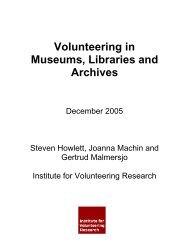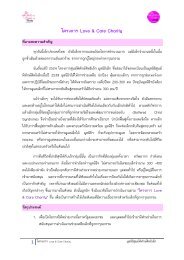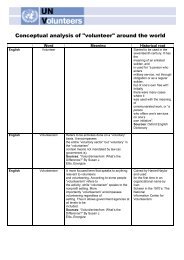Marketing Initiatives and Campaigns to promote Volunteering - a ...
Marketing Initiatives and Campaigns to promote Volunteering - a ...
Marketing Initiatives and Campaigns to promote Volunteering - a ...
Create successful ePaper yourself
Turn your PDF publications into a flip-book with our unique Google optimized e-Paper software.
“An organised period of substantial engagement <strong>and</strong> contribution <strong>to</strong> the local,nation or world community, which is recognised <strong>and</strong> valued by society, <strong>and</strong> forwhich there is only minimal monetary compensation <strong>to</strong> participants.” (Stanley,2004)The major American volunteering programs (eg U.S. Peace Corps, AmeriCorps, U.S.A.Freedom Corps) are examples of the community service model. Americorps, for example,provides accommodation, a weekly stipend <strong>and</strong> an educational award in return for a yearof full-time service.Stanley makes the point that since one of the defining features of volunteering is that it isunpaid,“it is therefore undermined by using the term <strong>to</strong> describe activities which are infact remunerated in some way. Using the term ‘volunteering’ <strong>to</strong> describeactivities that do not meet the unpaid criteria unhelpfully alienates parts of thevoluntary <strong>and</strong> volunteering sec<strong>to</strong>rs <strong>and</strong> should be avoided.”Cultural valuesThis distinction between volunteering <strong>and</strong> community service is of particular significancein determining the best means of promoting volunteering in Australia, since Australianvolunteers have not traditionally been remunerated for their efforts. It remains a mootpoint whether the majority of Australians are influenced more by British or Americancultural values at the beginning of the 21 st century. However, <strong>to</strong> adopt the Americanmodel of remunerated community service <strong>and</strong> <strong>promote</strong> it as ‘volunteering’ without dueregard <strong>to</strong> Australian attitudes <strong>to</strong>wards volunteering could have unexpected, possiblyunwelcome, outcomes in the Australian context.It has also been suggested that other significant social <strong>and</strong> cultural differences betweenthe United States <strong>and</strong> Britain have contributed <strong>to</strong> differences in attitude <strong>to</strong>wards theconcept of volunteering, for example:‣ a far higher rate of participation in organised religion in the United States than inthe United Kingdom, with an inevitable impact on shared values;‣ the experience in Britain of more than fifty years of the Welfare State, which hasgenerated in many people a belief that the state bears responsibility for assistingthose in need.Tony Blair has been quoted as asking, presumably rhe<strong>to</strong>rically: “What does it say aboutthe country we became in the late 20 th century that do-gooding became a term of abuse?”(http://society.guardian.co.uk/volunteering/s<strong>to</strong>ry/0,8150,575326,00.html). Stanley pointsout that, in the UK, the concept <strong>and</strong> word ‘volunteering’ causes some groups <strong>to</strong>18













![[PDF] ดาวโหลดใบสมัคร](https://img.yumpu.com/27792585/1/184x260/pdf-.jpg?quality=85)
